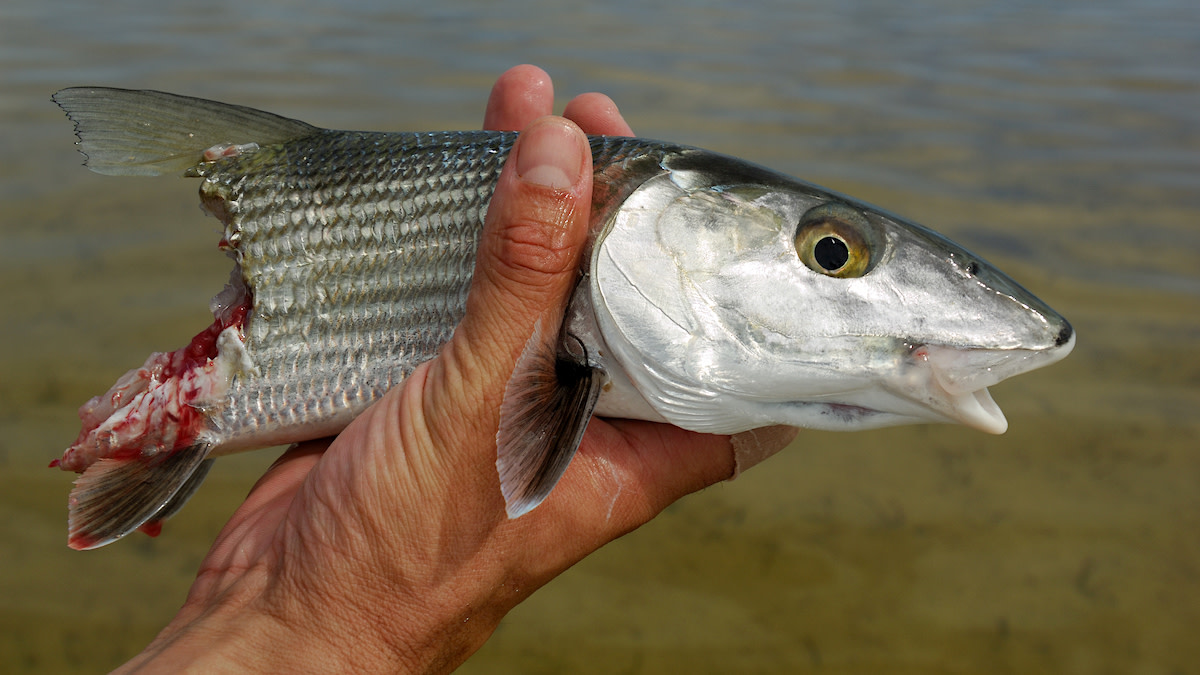
Line is peeling off the reel, but with one last violent pull, the fight dies out. A lifeless weight ensues, and what remains on the hook is merely stolen and shredded dreams. The taxman strikes again.
Ernest Hemingway had his ways of dealing with sharks, included a Tommy Gun for a couple well-placed shots while compensating for water refraction—something his “old man” Santiago was deprived of at sea. Modern anglers are left leaning over the gunwales screaming and cursing a full-bellied muskie, bull trout, blacktip, ‘cuda, goliath grouper, Steller’s sea lion, or any other piscivorous fish or mammal lingering alongside the boat, patiently waiting for another easy meal. Here are some ideas to combat these ruthlessly talented critters.
Reefing the Reel and Strategic Retreat Renowned fisherman and T.V. host Carter Andrews has run into this situation countless times. “All predators in the ocean try to single out the weakest fish in the school. It’s their instinct to come to something struggling,” he told MeatEater.
Fish emit and detect vibrations in the water, signaling stress or other conditions to other fish. Read our article about how that works here. Predatory fish will often key in on the source of that panic and attack it right away.
In normal circumstances, fish on the line will pull one direction, turn their head, then start pulling in the other. Inconsistent left-to-right movement in a rapid manner often means your catch is being hunted by something bigger.
That something bigger will often cause quite the scene. Multiple splashes near the end of your line could mean other fish in the school are chasing your catch, but it could also be the dorsal fin of a ‘cuda or shark. If it's well under the surface, you may feel the fight intensify or the fish run toward cover. Even a bluegill will behave differently if a big pike is snooping up behind it. When the worst-case scenario begins to play out, start pulling that fish to the boat as fast as possible. In areas where such taxation is a concern, it’s not a bad idea to scale up your tackle. The less time you spend cranking, the less opportunity a predator has to steal your lunch.
If the fish on the line is in imminent danger without the possibility of retrieval, Andrews will frequently take a less-than-obvious approach. He will either cut the line or open the reel bail, allowing his fish to outrun the shark or barracuda in pursuit. He stresses the importance and value of gamefish, and prioritizes a successful release over a grip-and-grin.
Know When to Walk Away During a grizzly bear study in Wyoming, researchers found that the collared predators would sometimes follow hunters in hopes of finding an abandoned gut pile. These grizzlies made the connection between free food and hunter—a prime example of an animal adapting to get an easy meal. Ocean predators are intelligent beings as well, and like most critters, want to expend the least amount of energy possible to gather calories. According to Andrews, sharks will sometimes listen to the pitch of a motor and move in when the boat reduces speed.
Once a predator shreds a fish on the line, many more may show up. The chummed-up water will soon become a massacre. Knowing when to open up the engines and move on to another area is a skill in itself. It’s hard to leave a productive area that took work to find, but it may be best for everyone.
Incorporating Tech A company called Sharkbanz claims to have demonstrated a promising ability to reduce and deter unwanted shark interactions. They employ a small electromagnetic device hanging below the hook creating a “force field” of magnetism around the hooked fish. Testing and video evidence appear to back up their claims of its efficacy.
The electromagnetic field created by the device produces a signal magnitudes more powerful than most fishes' lateral lines. The inventors describe the reaction of sharks coming in contact with the device as, “having a bright light suddenly shined in your eyes in a dark room. You would not be hurt, but you would want to turn away.”
The U.S. Military has also dabbled in shark deterrents dating back to World War II. Stories shared about the 12-minute sinking of the U.S.S. Indianapolis left sailors and pilots horrified and commanders seeking solutions. Historians estimate that 150 men lost their lives on that ship in what is considered the most extensive shark attack in recorded history.
According to SciTechDaily, to ease concerns, the military sought to develop an effective method for keeping sharks at bay. They tested a plethora of chemical substances, going as far as grinding up dead sharks on the rumor that rotting shark flesh discouraged live ones from eating. The project was largely unsuccessful, but that didn’t stop the military from giving out a substance termed “Shark Chaser” in hopes of raising morale.
Short of old wive's tales and newfangled technology, you can also use the simple sonar unit on your boat to monitor predatory fish in the near vicinity. If you can see the fish on your line reflected in the sonar display, you'll be able to see if something bigger is coming after it.
Please Don’t Feed the Wildlife Avoiding ocean and freshwater predators is becoming increasingly difficult in many waters. Regulation against finning, concerns over Ciguatera fish poisoning, and a general public understanding of why predators are essential for an ecosystem have helped bring back once-dismal populations of sharks, barracudas, muskies, and other fish eaters. Learning to coexist with predators peacefully may not sound as legendary as opening up on them with .45 ACP, but it is necessary for conserving the natural order. And maybe you should even try fishing for those toothy critters on purpose. It can be fun as hell.
Feature image via Tosh Brown.





Conversation